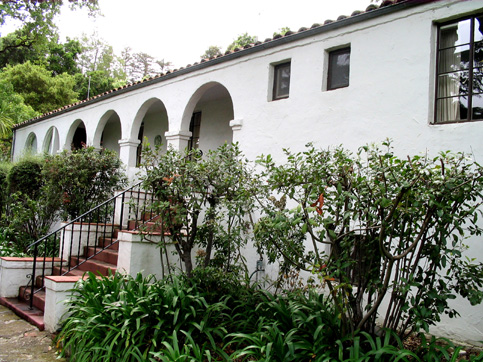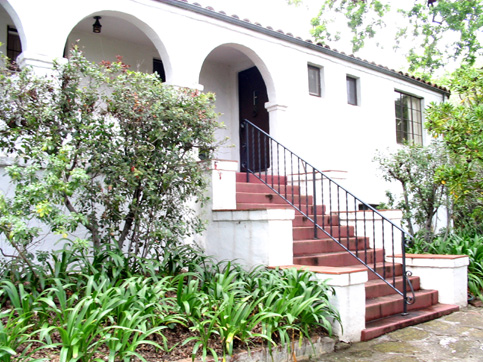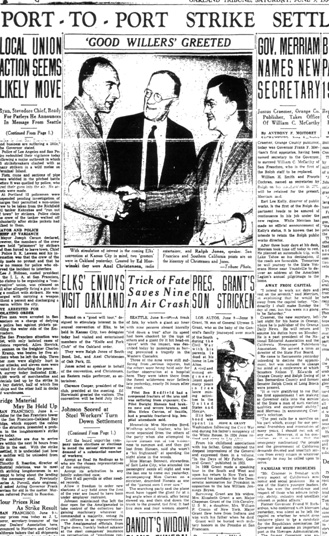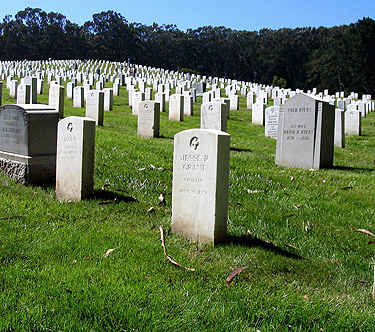 In
1873 Jessie made his first trip west to California, with Willoughby
Cole, the son of United States Senator Cornelius Cole. In San
Francisco Mrs. Cole told him several children's parties were arranged.
The prospect of parties frightened Jesse, a regular trait. Mrs.
Cole, apparently sensitive to this, canceled and declined invitations
on his behalf. When he got back to Washington, however, parties
intruded on his life in another way.
In
1873 Jessie made his first trip west to California, with Willoughby
Cole, the son of United States Senator Cornelius Cole. In San
Francisco Mrs. Cole told him several children's parties were arranged.
The prospect of parties frightened Jesse, a regular trait. Mrs.
Cole, apparently sensitive to this, canceled and declined invitations
on his behalf. When he got back to Washington, however, parties
intruded on his life in another way.
Nellie and Jesse Grant c. 1870
His sister Ellen - "Nellie" - just two years older
than Jessie, was a party girl. Mother Julie indulged Nellie's
partying, but being of Southern stock, Julia had strict notions
about chivalry. It was "unthinkable" for Nellie to go
out in the evening, no matter where or with whom, unless accompanied
by a male family member. Both older brothers Frederick and Ulysses
Jr. being away at West Point and Harvard, respectively, the only
available male family was Jesse. Nellie had to party with her
younger brother as escort. Both disliked it, besides which Jesse
was afraid of girls.
Jesse's and Nellie's formal educations lurched along. Nellie was
sent to a good girls' boarding school in Connecticut. In just
one hour she sent her parents three telegrams saying she would
die if she had to stay there. A White House aide brought her back.
About a year later Jesse was sent to boarding school in Cheltenham,
near Philadelphia. After a few months he also wrote that he wanted
to come back to the White House. Grant had him return immediately.
Jessie made another trip to California in 1874. In the Midwest
he linked up with his oldest brother Frederick Dent Grant. Frederick
married shortly afterwards, but the marriage that really got attention
was Nellie's. At age 17 she met an aristocratic Englishman, Algernon
Sartoris. When it became obvious that the two were considering
marriage, President Grant worried that Nellie was too young, and
he knew nothing about Sartoris. Nonetheless in 1874 Nellie and
Algernon were married in an elaborate ceremony in the White House
East Room. Grant was seen afterwards on his bed crying. Nellie
was going to England and he would miss her terribly. "Nellie
was gone," said Jesse, "the White House strangely empty."
 In
spite of Jesse's erratic education, he entered Cornell University
in the autumn of 1874, aged under 17. Two years later, 1876, there
was talk of nominating President Grant for a third term. Grant
refused to have his name presented at the Republican Convention.
The campaign that followed resulted in the most bitterly contested
presidential election in history, with Republican candidate Rutherford
Hayes being declared the winner by the House of Representatives
even though his Democratic opponent had outpolled him by 250,000
popular votes.
In
spite of Jesse's erratic education, he entered Cornell University
in the autumn of 1874, aged under 17. Two years later, 1876, there
was talk of nominating President Grant for a third term. Grant
refused to have his name presented at the Republican Convention.
The campaign that followed resulted in the most bitterly contested
presidential election in history, with Republican candidate Rutherford
Hayes being declared the winner by the House of Representatives
even though his Democratic opponent had outpolled him by 250,000
popular votes.
Jesse Root Grant in his early twenties
Hayes's accession to the presidency, and one undistinguished term,
brought relief to Grant. He had saved $15,000 on which to take
a trip around the world as long as the money lasted. Jesse dropped
out of Cornell, and on May 17, 1877 sailed with his parents on
the Indiana. After a rough but uneventful voyage they arrived
in Liverpool.
Expecting only local American representatives to receive them,
the three Grants found the harbor bedecked with flags and the
Lord Mayor and prominent citizens at the dock. The pattern continued
through the British Isles and afterwards. Crowds and honors greeted
Grant in Manchester, Sheffield, and Leicester; workmen got a half-holiday
on his arrival.
There was a month in London of almost continuous entertainment.
Try as Jesse would, he could not escape all the dinners and receptions.
They saw Nellie at her home in Southampton, went back to London,
where Jesse's remark about attending so many events got him unfavorable
mention in the newspapers, and were about to leave when they got
the ultimate invitation to see Queen Victoria at Windsor Castle.

Victoria had been withdrawn ever since the untimely death of
her husband Prince Albert in 1861. The Grants were met at Windsor
by Master of the Household Sir John Cowell, who explained that
Her Majesty was out driving and would receive them later. As Jesse
was dressing for dinner, Sir John appeared. Her Majesty was indisposed,
he said. "Large gatherings, particularly at dinner, bring
on a most distressing vertigo. As a consequence of this deplorable
condition it has been decided that only those who must be present
are to dine with Her Majesty." Jesse would dine with the
household and would be presented to Her Majesty afterwards. The
newspapers would suggest that he had dined with the Queen.
Jesse was not amused. "It would appear that I can have all
the honor by report, and avoid even the tedium of dining with
the Household, by quickly leaving for London." His reaction
practically provoked a diplomatic crisis. "A tremendous scandal
would result," said Sir John, if the newspapers heard of
it. Jesse said he wouldn't tell them the Queen decided he was
only fit to eat with the help. "You do not understand,"
gasped Sir John. "Queen's Household are nobility." Assured
he could not leave, Jesse said "Just watch me," and
began packing. Sir John pleaded with Jesse to understand the foibles
of an old lady - Victoria - in ill health, which only convinced
Jesse that Victoria herself objected to his presence.
Sir John brought the American minister, who said he would tell
Jesse's father about his conduct. Jesse agreed to do whatever
Grant Sr. wanted. Grant said that in Jesse's place he would do
as he did. The crisis was finally averted when Sir John appeared
as Jesse was about to walk back to the train station and announced
that Her Gracious Majesty would be pleased to have Jesse at dinner.
After dinner and billiards Jesse returned to his quarters to find
Sir John with a bottle of brandy. Sir John told him about life
at Windsor. It seemed Victoria was always indisposed when a visitor
arrived, but the newspapers were always told things had proceeded
as planned. The brandy bottle was almost empty by morning.
Receptions and honors for General Grant and family continued on
the Continent, when they went to Scotland, and on the Continent
again. The Grants were at the Paris Exposition in May, 1878, when
oldest son Fred joined them. Jesse crossed the Atlantic back home,
to enter Columbia Law School in the fall. General and Mrs. Grant
continued east, through Suez, India, China, and Japan.
 After
yet another round of receptions and dinners in Japan, and meeting
the emperor, General and Mrs. Grant boarded the steamer City of
Tokio in September 1879 to cross the Pacific.
After
yet another round of receptions and dinners in Japan, and meeting
the emperor, General and Mrs. Grant boarded the steamer City of
Tokio in September 1879 to cross the Pacific.
Grant in China, 1879

When the Grants arrived in San Francisco on September 20th, their
reception surpassed anything ever given an American anywhere in
the United States. Jesse had crossed the continent to meet them,
linking up with older brother Ulysses Jr. ("Buck"),
out from New York. They took ship through the Golden Gate with
a reception committee and boarded the Tokio.
It passed into San Francisco Bay seen, it seemed, by every citizen
in and around the city. "Telegraph Hill was a living mass
of human bodies," wrote a biographer, "and the heights
beyond…and every pier head were covered with spectators."
After the vessel docked, spectators packed Market to see the Grants
and their party drive to the Palace Hotel. Snatching a moment
alone with Jesse, Julia asked him not to notice if Grant's speech
seemed strange; a servant on board ship had accidentally thrown
his dental plate with two front teeth overboard, and he frequently
whistled.
The Grants journeyed inland to Yosemite and returned to San Francisco
for another round of receptions and banquets. During their stay
it was rumored that Buck had become enamored of Jennie Flood,
daughter of silver millionaire James Flood. If so, nothing came
of it. In November 1880 Buck married Fannie Chaffee, daughter
of Colorado Senator Jerome Chaffee, in New York City.
Jesse, however, seems to have formed a connection in San Francisco
in 1879. He never gave details, but it is probable that at that
time he met Elizabeth Chapman, daughter of San Francisco real
estate figure William S. Chapman. They were married in San Francisco
in September 1880.
 Julia
had tired of traveling and was ready to return home in 1879. Grant
would have liked to see Australia, which would have meant traveling
another six months and returning in spring, 1880. His political
associates would also have preferred that. They were planning
to get nominate Grant for a third term as president, and the timing
of his return would have been better.
Julia
had tired of traveling and was ready to return home in 1879. Grant
would have liked to see Australia, which would have meant traveling
another six months and returning in spring, 1880. His political
associates would also have preferred that. They were planning
to get nominate Grant for a third term as president, and the timing
of his return would have been better.
In San Francisco Jesse discussed the third term with Grant, who
dreaded it, but would accept it. He made no efforts on his own
behalf. His supporters, called "stalwarts" for their
opposition to Civil Service reform, entered him at the 1880 Republican
National Convention in Chicago. After multiple ballots the party
nominated reform candidate James Garfield. Garfield won election
narrowly, but six months after his inauguration he was shot by
a disaffected stalwart. After lingering months, he died and was
succeeded by Vice-President Chester A. Arthur.
Grant had spent most of his money in his world trip, but a lucky
investment in Nevada Silver mines yielded several thousand dollars.
Buck had a profitable law practice in New York City, and had met
a Wall Street investor named Ferdinand Ward, with whom he went
into partnership. General Grant and Buck invested practically
all they had in the firm, which paid handsome dividends - too
handsome. In spring 1884 the firm was besieged by unpaid creditors.
Ferdinand Ward was the 1880's equivalent of Bernard Madoff, and
had run what would nowadays be called a Ponzi scheme. The firm
collapsed and Ward went to prison. General Grant at 62 was without
income and had only a few hundred dollars.
About the same time Grant had unpleasant sensations in his throat.
Reluctantly seeing a doctor, he learned that he had epithelial
cancer, a death sentence. A professional soldier who saw thousand
of men die, Grant was less concerned for himself than for Julia,
who would be left destitute. Mark Twain, whom he had known for
several years, urged Grant to write his memoirs and Twain would
publish them.
 The
pains in his throat made dictating impossible for Grant, but he
wrote at a pace that would be remarkable for anyone and is amazing
for someone with a terminal illness. Grant had written a few articles
for the Century magazine, but no one had ever considered him a
literary man. His style was direct and vastly more readable than
the overblown writings of most public figures in the Victorian
era. His memoirs would rank among the best accounts by a military
man since the Commentaries of Julius Caesar.
The
pains in his throat made dictating impossible for Grant, but he
wrote at a pace that would be remarkable for anyone and is amazing
for someone with a terminal illness. Grant had written a few articles
for the Century magazine, but no one had ever considered him a
literary man. His style was direct and vastly more readable than
the overblown writings of most public figures in the Victorian
era. His memoirs would rank among the best accounts by a military
man since the Commentaries of Julius Caesar.
Grant, very ill, writes his memoirs.

The family moved Grant to a house at Mount McGregor in the Adirondacks
Mountains of New York State. Jesse, his wife Elizabeth, and their
daughter Nellie came, along with the other sons, their families,
and Grant's daughter Nellie. Grant's misgivings about her marriage
had been born out. Algernon Sartoris was a heavy drinker and philanderer,
and died after the birth of their fourth child. Nellie returned
to the United States, but being the wife of a British subject
she had lost her citizenship and had to petition Congress to restore
it.
With his family gathered around him, Grant wrote in the mornings.
Jesse's wife Elizabeth would read back to him in the afternoons,
while Grant made notes and corrections. The memoirs were finished
in June, 1885. On July 23rd, Ulysses S. Grant died. His funeral
was the largest in New York City's history. The memoirs would
give Julia over $400,000 in royalties.
Jesse had dropped out of Columbia Law School after only a year,
in fact he apparently never took a degree from any higher learning
institution. Having somehow learned about mining, he became a
free-lance mining engineer and was apparently successful. In 1888
he was in Mexico, leaving Elizabeth, daughter Nellie, and son
Chapman settled in the San Francisco Bay Area. In 1889 they lived
in Alameda. By 1893 they had leased a house in Piedmont, the upscale
East Bay suburb, but did not stay long.
 Buck's
wife in New York had health problems, and he moved his family
to San Diego for its congenial climate.
Buck's
wife in New York had health problems, and he moved his family
to San Diego for its congenial climate.
Buck Grant, Jesse's older brother, in California c. 1900
In October, 1893 Jesse and his family also moved to San Diego,
where they rented a cottage on First Street. They bought a lot
at Sixth and Quince streets and built a two-story colonial-style
home for between five and six thousand dollars. Julia would come
out during the winters, and stay either with Jesse, Buck, or Nellie,
who had moved to Santa Barbara.

A huge crowd at the dedication of Grant's Tomb.
In 1897 the Grant family reunited for the dedication of General
Grant's tomb on Riverside Drive, New York City. General Grant's
remains were moved from a temporary vault to a massive neoclassical
structure that was and is one of the most conspicuous on the city's
west side. A huge crowd heard speeches by former President Grover
Cleveland and President William McKinley.

The family sat on the front row of the speaker's stand. Jesse
is at far left, unfortunately obscured by somebody's umbrella,
wife Elizabeth next to him. Nellie is next to her mother Julia.
The bearded man is probably the oldest son Frederick Dent Grant,
although he may be Ulysses Jr.
Julia died in 1902 and was entombed next to her husband.
In San Diego, Jesse's and Buck's real estate ventures were profitable.
Buck made one attempt at politics, running for the United States
Senate in 1904 and losing. Jesse was rootless, never staying in
one place long, leaving his wife and children.
In 1907 he tried politics himself, making a tour through Texas,
Louisiana and the southwest, sounding out support for a candidacy
for President of the United States on the Democratic ticket. On
March 5, 1908 the New York Times reported that Jesse would challenge
two-time candidate William Jennings Bryan for the Democratic nomination.
You may ask, what were Jesse Grant's qualifications for the presidency?
Good question! The Times reporter was plainly unimpressed with
Jesse's chances, and his candidacy was practically ignored.
Bryan was nominated for the third time, and lost for the third
time, to Theodore Roosevelt's successor William Howard Taft. Jesse
ventured into politics indirectly in 1912 by endorsing Democratic
candidate Woodrow Wilson. Speaking from his home in New York in
October, he compared the issues facing the country with those
in 1860 when the country split over the slavery issue and made
his father's career.
"As a son of the soldier who fought to uphold the principles
for which Abraham Lincoln stood and as a son of a Republican president,
I can see only one duty for myself - to give heartily my influence
and my vote for principle and not for the name of a party long
since divorced from its sympathy for the common man. Verily, I
believe that the principles for which Woodrow Wilson is fighting
are the principles for which my father fought, and that he (Wilson)
alone among the presidential candidates measures up to the standards
of courage, conscience and capacity of the leader whose hand my
father helped to uphold."
Jesse's vote may have counted, but his influence would not: the
Republican Party had split between incumbent Taft and third-party
candidate Theodore Roosevelt, and Wilson won easily.
Jesse made headlines again in 1913. On July 23rd, in Goldfield,
Nevada, where he had lived over six months, he filed for divorce
against his wife of 33 years on grounds of desertion. The suit
came as a surprise to Elizabeth, then living in San Francisco
with her son Chapman and mother at 3701 Washington Street in Pacific
Heights.
"This is the first information I have received regarding
the divorce action taken by my husband. I am surprised that he
should have charged me with desertion. I have never left my children
nor my home, except to go with him. If there has been any desertion
it is then on his part.
"You might say that the separation dates almost from the
time of our marriage…since which time he has been away on
mining business in many parts of the world. I have gone with him
to Mexico, to New York and to many different places where he has
had business interests, leading a nomadic existence…
"Mr. Grant has known that I was here. He has not seen fit
to come here. It has been two years since have seen him."
Jesse's case rested on a letter written him by Elizabeth from
San Diego in 1910. "I shall always treat you with respect
as long as you never come nearer me than you are at this minute
(Jesse was in New York)… The world is much more beautiful
to me seen without the black veil of misery and hopelessness in
which I last lived for a greater part of the last twenty-eight
years. Through all the years we had a home in San Diego you spent
the greater part in New York and my mother…has come to live
with me in a tiny apartment.
"Four years ago, when I went East, you had an opportunity
to reform, but did not choose to take advantage of it… I
am no more to you than any of the other women you have thrown
over, so please drop the subject and try to live without scandal
on your father's account."
The suit failed in March, 1914 when a Goldfield, Nevada judge
ruled against Jesse. Under the ruling Elizabeth continued to share
in a $5,000 annuity and community property. The following June,
1914 Jesse asked Elizabeth to return to him in New York. She refused.
In 1915 the supreme court of New York State granted Elizabeth's
application for alimony, to continue until either party's death
or divorce. Jesse tried divorce again.
In August, 1918 he got a Nevada divorce, uncontested by Elizabeth.
One week later in New York, 60-year-old Jesse married 41-year-old
Mrs. Lillian Burns Wilkins, a widow of Inwood, New York. The couple's
residence may have been in the east, but in 1924 Lillian died.
Jesse took up the final residence of his peripatetic life, probably
just after Lillian's death. For unclear reasons, possibly the
cheap land and the climate, he came to Los Altos. The 1930 census
and 1926 voter registration list show his address at P.O. Box
296, Fremont Road. Apparently wanting to leave memoirs like his
father, Jesse wrote a biography Days of My Father General Grant,
co-written by Henry Granger. Days covers Jesse's memories
of the Vicksburg campaign, to 1880 when Grant failed re-nomination
for the presidency. It was published in 1925 by Harper and Brothers.
The lists also show Kathryn Nielsen, born Pennsylvania 1888, occupation
"housekeeper," P.O. Box 296, Fremont Road. Kathryn Nielsen
was more than Jesse's housekeeper. In 1930 they bought a hillside
lot and built a home at a cost of $5,663.00. A deed of trust confirms
joint ownership by Jesse and Ms. Nielsen.The house, like so many
others on the Peninsula, is in Mission Revival style, rambling
and livable
 .
.
Jesse Grant's, Los Altos Hills

Grant house, right side
Somehow it got the name Five Oaks, although there are now only
four oaks and a stump on the property. Jesse Grant lived there
only four years.
 On
June 8, 1934 he died. In death as in life, he was "General
Grant's son."
On
June 8, 1934 he died. In death as in life, he was "General
Grant's son."
The Palo Alto Times reported "U.S. GRANT'S SON DIES
AT LOS ALTOS." The Chronicle reported "Grant's Last
Child Expires." His three siblings had predeceased him.
Oakland Tribune, June 9, 1934, reports "Pres. Grant's
Son Stricken."
Other papers had similar accounts, always U.S. Grant's son.
Jesse's status regarding General Grant being "dependent,"
he was interred at the National Cemetery at the Presidio of San
Francisco.
Kathryn married a local realtor, Lawrence Whitham. After her
death in 1944 the house was sold and has had had three owners
since. It has been modified, but the house and grounds retain
the peacefulness that must have appealed to the restless man who
spent the last years of his life there.

Jesse Grant's grave, National Cemetery, Presidio of San Francisco.
Photos of the house and grave by John &
Lana Ralston